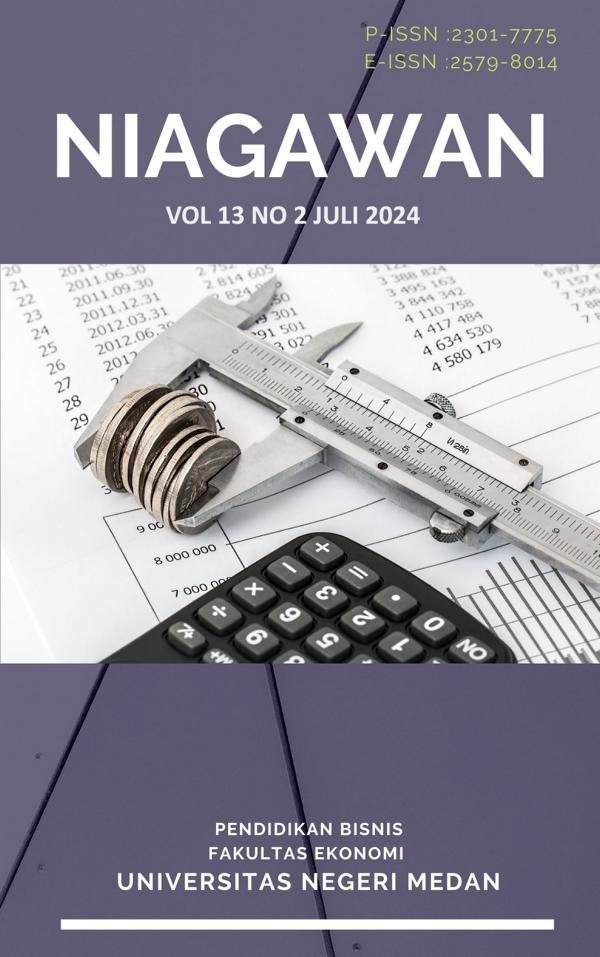ANALISIS PERSEPSI KULIAH KEWIRAUSAHAAN DALAM MEMBENTUK MINAT BERWIRAUSAHA MAHASISWA
DOI:
https://doi.org/10.24114/niaga.v13i2.58533Keywords:
Minat berwirausaha, Persepsi kuliah kewirausahaan, Prodi KewirausahaanAbstract
This study aims to examine the effect of perceptions of entrepreneurship lectures on students' entrepreneurial intention in the Department of Entrepreneurship, Faculty of Economics, Universitas Negeri Medan. This study is important because the Department of Entrepreneurship is a department that has the vision of creating new entrepreneurs among undergraduates. The purpose of this department to form graduates who are not job seeking oriented but focus on entrepreneurship and creating jobs. Given that this department is just operating in the 2020-2021 academic year and does not yet have alumni, it is necessary to conduct research on the effectiveness of lectures in the department of entrreprenership as measured by students' entrepreneurial intention. The survey was conducted using a Likert scale questionnaire. The collected data were analysed using Structural Equation Modelling (SEM) using Smart PLS. The results found that the perception of entrepreneurship lectures has a positive effect on students' entrepreneurial intention. The results of this study emphasise the importance of providing good perceptions of entrepreneurship lectures to students to develop their entrepreneurial intention.References
Alfitman A & Gatot. (2009). Analisa Dampak Kuliah Umum Kewirausahaan Terhadap Pembentukan Sikap dan Motivasi Kewirausahaan Mahasiswa Unand Padang. Penelitian Dipa Unand.
Baharuddin, B., & Wahyuni, E. N. (2008). Teori belajar dan pembelajaran. http://repository.uin-malang.ac.id/6124/
Barba-Sánchez, V., & Atienza-Sahuquillo, C. (2018). Entrepreneurial intention among engineering students: The role of entrepreneurship education. European Research on Management and Business Economics, 24(1), 53“61. https://doi.org/10.1016/j.iedeen.2017.04.001
Cera, G., Mlouk, A., Cera, E., & Shumeli, A. (2020). The impact of entrepreneurship education on entrepreneurial intention. A quasi-experimental research design. Journal of Competitiveness, 12(1), 39“56. https://doi.org/10.7441/joc.2020.01.03
Cui, J., Sun, J., & Bell, R. (2021). The impact of entrepreneurship education on the entrepreneurial mindset of college students in China: The mediating role of inspiration and the role of educational attributes. International Journal of Management Education, 19(1), 100296. https://doi.org/10.1016/j.ijme.2019.04.001
Gillin, L. M. (1991). Entrepreneurship Education: the Australian Perspective for the Nineties. Journal of Small Business & Entrepreneurship, 9(1), 60“72. https://doi.org/10.1080/08276331.1991.10600392
Hahn, D., Minola, T., Bosio, G., & Cassia, L. (2020). The impact of entrepreneurship education on university students™ entrepreneurial skills: a family embeddedness perspective. Small Business Economics, 55(1), 257“282. https://doi.org/10.1007/s11187-019-00143-y
Hermansyah. (2020). Analisis Teori Behavioristik (Edward Thordike) dan Implementasinya Dalam Pembelajaran SD/MI. Jurnal Program Studi PGMI, 7(1), 1“11.
Liu, X., Lin, C., Zhao, G., & Zhao, D. (2019). Research on the effects of entrepreneurial education and entrepreneurial self-efficacy on college students™ entrepreneurial intention. Frontiers in Psychology, 10(APR), 1“9. https://doi.org/10.3389/fpsyg.2019.00869
Lv, Y., Chen, Y., Sha, Y., Wang, J., An, L., Chen, T., Huang, X., Huang, Y., & Huang, L. (2021). How Entrepreneurship Education at Universities Influences Entrepreneurial Intention: Mediating Effect Based on Entrepreneurial Competence. Frontiers in Psychology, 12(July), 1“12. https://doi.org/10.3389/fpsyg.2021.655868
Mahendra, A. M., Djatmika, E. T., & Hermawan, A. (2017). The Effect of Entrepreneurship Education on Entrepreneurial Intention Mediated by Motivation and Attitude among Management Students, State University of Malang, Indonesia. International Education Studies, 10(9), 61. https://doi.org/10.5539/ies.v10n9p61
Mardiyani, K. (2022). Tujuan Dan Penerapan Teori Behaviorisme Dalam Pembelajaran. Jurnal Ilmu Pendidikan Dan Kearifan Lokal, 2(5), 260“271. http://jipkl.com/index.php/JIPKL/article/view/30
Ndofirepi, T. M. (2020). Relationship between entrepreneurship education and entrepreneurial goal intentions: psychological traits as mediators. Journal of Innovation and Entrepreneurship, 9(1). https://doi.org/10.1186/s13731-020-0115-x
Santos, S. C., Neumeyer, X., & Morris, M. H. (2019). Entrepreneurship Education in a Poverty Context: An Empowerment Perspective. Journal of Small Business Management, 57(S1), 6“32. https://doi.org/10.1111/jsbm.12485
Sekaran, U & Bogie (2013). Research Methods for Business: A Skill-Building Approach. Leadership & Organization Development Journal, 34(7), 700“701. https://doi.org/10.1108/lodj-06-2013-0079
Wardana & Ahdar Djamaluddin. (2021). Belajar dan Pembelajaran Teori, Desain, Model Pembelajaran dan Prestasi Belajar.
Fe.unimed.ac.id
Mediaindonesia.com
Setkab.go.id
Downloads
Published
Issue
Section
License
Authors who publish in this journal agree to the following terms:
- Authors retain copyright and grant the journal the right of first publication, with the work simultaneously licensed under a Creative Commons Attribution License that allows others to share and adapt the work with an acknowledgment of the work's authorship and initial publication in this journal.
- Authors can enter into separate, additional contractual arrangements for the non-exclusive distribution of the journal's published version of the work, with an acknowledgment of its initial publication in this journal.
- Authors are permitted and encouraged to post their work online before and during the submission process, as it can lead to productive exchanges and earlier and greater citation of published work. Where authors include such work in an institutional repository or on their website, we request that they include a statement acknowledging the Jurnal Perspektif Pembiayaan dan Pembangunan Daerah, including the name of the journal, the volume number, and a web link to the journal item.
- Authors should be aware that the Creative Commons Attribution 4.0 International License (CC BY 4.0) permits readers to share (copy and redistribute the work in any medium or format) and adapt (remix, transform, and build upon the work) for any purpose, even commercially, provided they also give appropriate credit to the work, provide a link to the license, and indicate if changes were made. They may do these things reasonably but not in any way that suggests the author or the publisher endorses their use.
NIAGAWAN by Program Studi Pendidikan Bisnis Fakultas Ekonomi Universitas Negeri Medan is licensed under CC BY-NC 4.0

